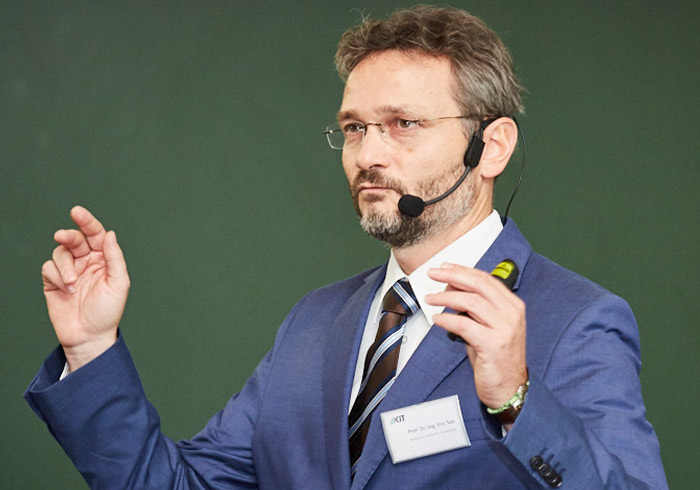Faces behind HECTOR School: Prof. Sax gives insights
Eric Sax studied electrical engineering and obtained his PhD. at KIT/ TU Karlsruhe. After being in charge of the group for Electrical Systems and Microsystems at the Research Center for Informatics (FZI), Prof. Sax joined a Daimler sub-company to build up and run the Test-Engineering department. In 2009 he became the head of electric and electronic development for Daimler Buses worldwide. 2014 he followed the call to KIT and is now head of the Institute for Information Processing Technologies (ITIV). His research specializes in systems engineering and you find Prof. Sax often as speaker in all types of media as his know-how in aspects to the current developments in the automotive industry is highly valued.
Tell us more about you and your research area:
What area and projects are you working in?
My PhD colleagues and I mainly work on topics for the automotive industry. Processes methods and tools starting at requirements definition, followed by model-based design, implementation, and testing to establish a seamless design flow is one focus of our research. New architectures for functions and electronic devices, versions and variants management, and big data analytics are further hot topics in our funded and industrial projects.
Which industries do you support with your research?
Our main partners are the OEMs (Original Equipment Manufacturer) in Germany, such as Daimler, BMW, and VW. In addition, Bosch and ZF as Tier-1 suppliers are our research partners completed by tool vendors such as Vector Informatik and IPG. Of course in that companies, we cooperate mainly with the research and development departments on the topics mentioned before.
Thinking about your research area and the influences on industry, environment, or the society, what are the risks/what are you worrying about?
“The fast will eat the fat” – and sometimes I wonder if some companies are too fat already. They are slow-moving, the skills of the employees are great, but not on the promising topics. It is that kind of “innovators dilemma” that makes me wonder if we will manage all the challenges of future success.
Thinking about your research area and the influences on industry, environment, or the society what are the opportunities, what makes you feel optimistic?
A lot of companies in top management recognized the need for a change. That is most important. We can’t ignore anymore for example the need for “clean vehicles”. But now the transformation from all angles has to start quickly. Conservative forces are human, but there is a need to “jump” even with a little uncertainty. We have to move towards alternative drivetrains. automated driving, SW-management over the air and new EE-architectures embedded in a seamless design flow. And everybody has to accept that and push forward. And I am glad to recognize that, stepwise in a lot of partner companies.
What are you particularly proud of?
I am quite proud of “my” industrial products that are still on the road. This is something you can see and touch. In addition, I am proud of some impulses I gave nearly 10 years ago in board meetings about the future of public transportation and drivetrains that more or less came true – but that time nobody wanted to hear that. But in general and especially today I can say: “Because I stand on the shoulders of giants, I have the chance to see a little further than others.” And these giants are my PhD colleagues!
Thank you for your time and interesting insights Prof. Sax!
One Question – one Word-Answer
What is your favorite place in Karlsruhe? / or at the KIT?
A little garden behind the high court and the zoo.
Which book did you read lately?
Andrea Petkovic “Zwischen Ruhm und Ehre liegt die Nacht.”
What is your favorite app?
The weather app.
“Never stop learning” – More than ever before this should be our maxime.
Your favorite tool for your work:
The Microsoft surface and my calendar. Without that, I am lost.

Companies are enabled to accelerate the change process with a customized further education approach.
The targeted continuing education e.g. in digital transformation or alternative powertrains guarantees a high degree of reliability and a direct transfer into the company.
More Details
HECTOR School Academy offers standard and customized training solutions for professionals, providing latest academic insights as well as application-oriented teaching at the highest level.
Explore courses


